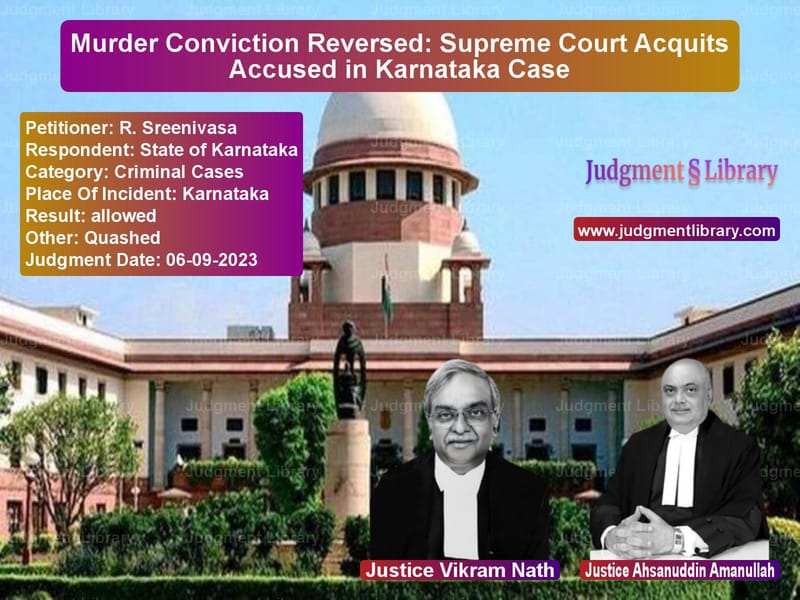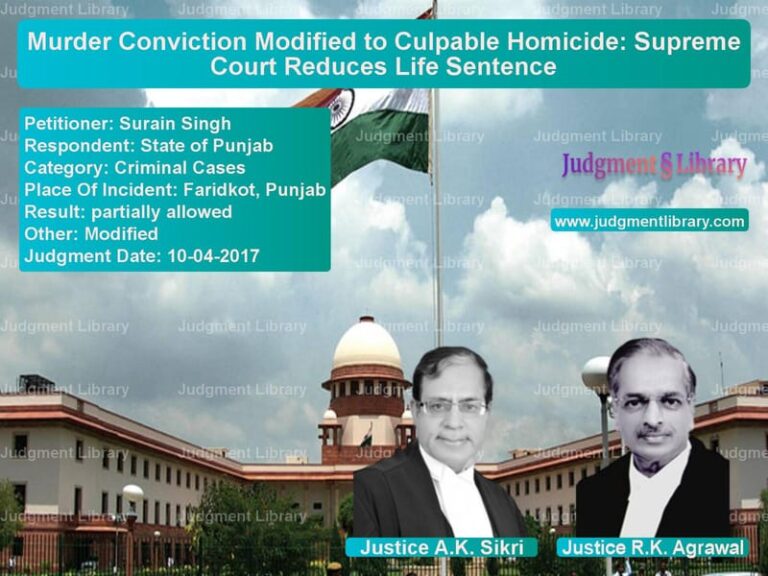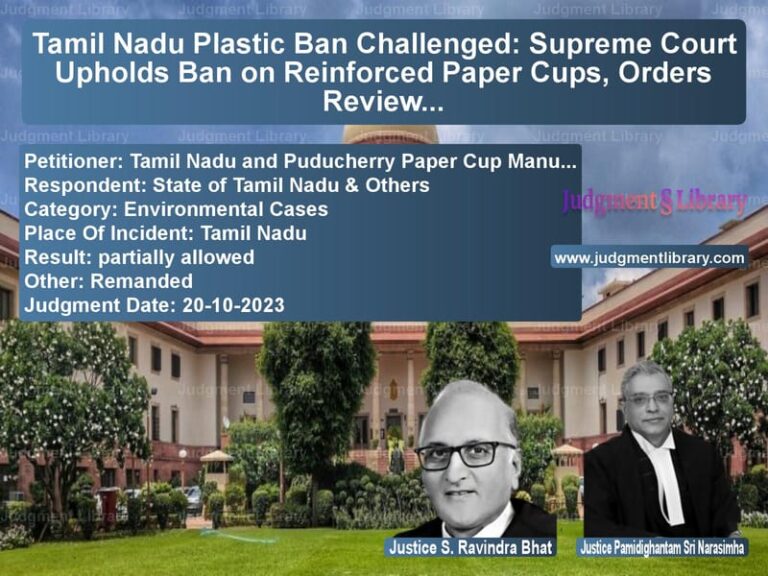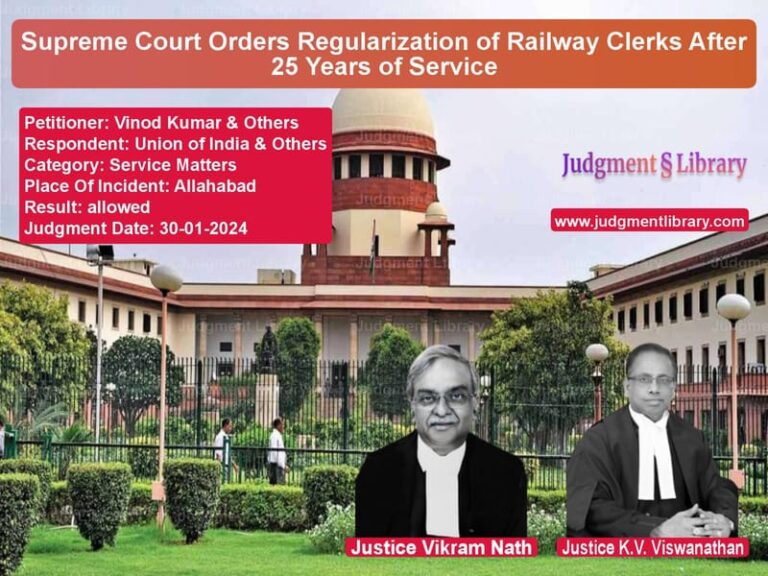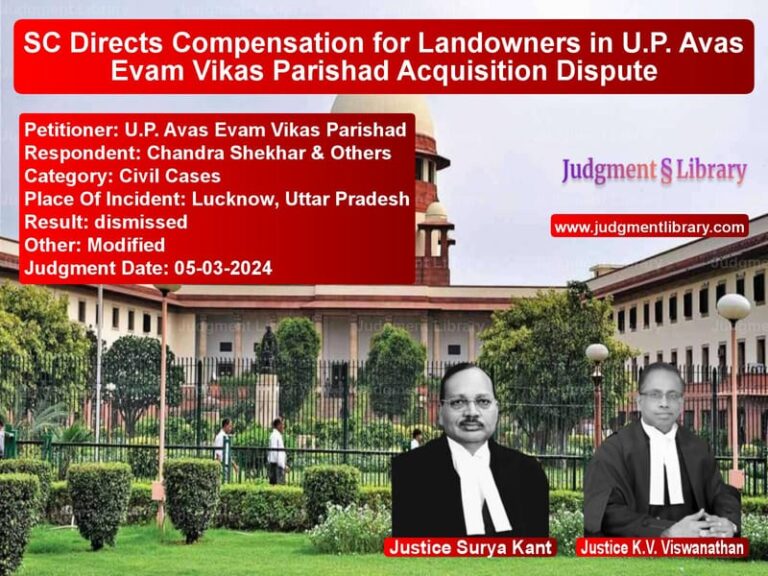Murder Conviction Reversed: Supreme Court Acquits Accused in Karnataka Case
The case of R. Sreenivasa vs. State of Karnataka revolves around a murder charge where the appellant was initially acquitted by the trial court but later convicted by the High Court based on circumstantial evidence. The Supreme Court had to determine whether the High Court’s decision to reverse the acquittal was justified.
Background of the Case
On January 3, 2002, an unidentified male dead body was found in a field. The deceased was later identified as Krishnappa. The prosecution alleged that the appellant, R. Sreenivasa, and another accused (A2) murdered Krishnappa due to his alleged illicit relationship with the appellant’s sister.
The trial court acquitted both accused in 2005, stating that the prosecution failed to prove:
- The deceased was last seen with the accused.
- The extra-judicial confession was reliable.
- The forensic evidence connected the accused to the crime.
The Karnataka government appealed, and the High Court reversed the acquittal for Sreenivasa while upholding the acquittal of A2, sentencing the appellant to life imprisonment under Section 302 of IPC.
Petitioner’s Arguments (R. Sreenivasa)
The appellant’s counsel argued:
- The trial court’s acquittal was based on sound legal principles and could not be overturned without strong evidence.
- The High Court erred in convicting Sreenivasa while acquitting A2, despite both being accused of the same act.
- The prosecution witnesses, including PW10, turned hostile, weakening the case.
- No forensic evidence established that the recovered blood belonged to the deceased.
- The deceased’s wife testified that the accused and the deceased shared cordial relations, negating a strong motive.
Respondent’s Arguments (State of Karnataka)
The prosecution argued:
- The appellant had a strong motive to kill the deceased due to the alleged relationship with his sister.
- The accused was last seen with the deceased.
- The accused failed to provide an alternative explanation for the deceased’s disappearance.
- In cases based on circumstantial evidence, an accused’s silence regarding their whereabouts strengthens the prosecution’s case.
Supreme Court’s Ruling
The Supreme Court carefully analyzed the case and found several inconsistencies in the High Court’s judgment.
1. Failure to Establish Last Seen Theory
- The prosecution relied on contradictory witness statements regarding who last took the deceased from his home.
- PW10, whose testimony was crucial, turned hostile and retracted his statement.
- The High Court convicted the appellant based on an unreliable last-seen claim.
2. Lack of Corroborating Evidence
- The forensic evidence was insufficient, and no blood samples linked the accused to the crime.
- No CCTV footage, call records, or independent eyewitnesses established a link between the accused and the crime.
3. Presumption of Innocence and Standard of Proof
- The Supreme Court reiterated that an acquittal grants the accused a double presumption of innocence, requiring exceptionally strong evidence to overturn.
- Since there were gaps in circumstantial evidence, the benefit of the doubt had to go to the accused.
Final Judgment
The Supreme Court set aside the High Court’s conviction and restored the trial court’s acquittal, ordering that the appellant be released from all legal liabilities.
Impact of the Judgment
This ruling reinforces several legal principles:
- Circumstantial evidence must be consistent and complete to justify conviction.
- The last seen theory alone cannot prove guilt without corroboration.
- Courts must exercise caution when overturning acquittals, ensuring there is overwhelming evidence against the accused.
Conclusion
The Supreme Court’s ruling in R. Sreenivasa vs. State of Karnataka upholds the fundamental principles of criminal jurisprudence—ensuring that convictions are based on clear, consistent, and strong evidence. By acquitting the appellant, the Court emphasized that the burden of proof must always rest on the prosecution, and in cases of doubt, the accused must receive the benefit.
Petitioner Name: R. Sreenivasa.Respondent Name: State of Karnataka.Judgment By: Justice Vikram Nath, Justice Ahsanuddin Amanullah.Place Of Incident: Karnataka.Judgment Date: 06-09-2023.
Don’t miss out on the full details! Download the complete judgment in PDF format below and gain valuable insights instantly!
Download Judgment: r.-sreenivasa-vs-state-of-karnataka-supreme-court-of-india-judgment-dated-06-09-2023.pdf
Directly Download Judgment: Directly download this Judgment
See all petitions in Murder Cases
See all petitions in Bail and Anticipatory Bail
See all petitions in Attempt to Murder Cases
See all petitions in Fraud and Forgery
See all petitions in Judgment by Vikram Nath
See all petitions in Judgment by Ahsanuddin Amanullah
See all petitions in allowed
See all petitions in Quashed
See all petitions in supreme court of India judgments September 2023
See all petitions in 2023 judgments
See all posts in Criminal Cases Category
See all allowed petitions in Criminal Cases Category
See all Dismissed petitions in Criminal Cases Category
See all partially allowed petitions in Criminal Cases Category

